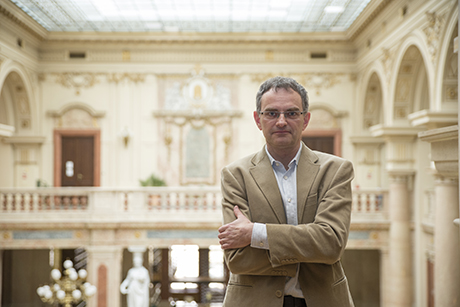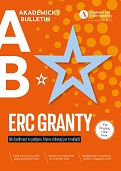
ERC grants only go to the very best researchers
02. 06. 2023
Innovative ideas and a well-written application. Without this, getting one of the European Research Council grants is highly unlikely. How can you succeed in the tough competition and improve your chances of winning generous funding? Why is the Czech Republic lagging behind other EU countries? ERC grants was the subject of the April issue of the in-house AB / Academic bulletin e-magazine of the CAS.
European Research Council (ERC) grants are, without exaggeration, the crème de la crème of targeted support available to European researchers. They fund research in all fields of science that has the chance to transcend the boundaries of current knowledge and make history. It is no wonder then that only the very best get to reap the rewards.
The only criteria? Quality
Since 2007, the ERC has supported frontier research – i.e., research that leads to ground-breaking discoveries. The basic principle is bottom-up, i.e., funding projects led by individual researchers and their teams without prescribing any thematic priorities. The ERC can be considered one of the most successful parts of the EU’s Framework Programmes for Research and Innovation.
Grant funding has progressed from the Seventh Framework Programme “Ideas” through “Horizon 2020” to the current Ninth Framework Programme “Horizon Europe”. Together with Marie Sklodowska-Curie Actions and Research Infrastructures, it forms Pillar I focusing on excellent research.
To date, ERC grants have supported more than 12,000 projects and more than 10,000 researchers. One hundred thousand applications have been assessed by evaluation panels. For the period of 2021–2027, the ERC is managing EUR 16 billion – i.e., 17% of the Horizon Europe budget – of which around two thirds are allocated to support researchers up to 12 years after obtaining their PhD.
“Researchers from all over the world can apply for a grant, provided their research occurs in an institution of an EU Member State – or in a country associated with the Framework Programme. The only evaluation criteria are the quality and potential of the proposal and of the principal investigator,” explains Eva Zažímalová. The President of the CAS was previously a panel evaluator for the ERC and since 2021 has been a member of the European Commission’s independent scientific advisory group. The seven-member Group of Chief Scientific Advisors helps with EU policymaking.
From novices to matadors
The ERC provides five types of grants. It supports researchers at different stages of their careers, but it also considers research teams and the potential use of the outputs of funded projects. Two of the grants are aimed at promising researchers. The ERC Starting Grants for researchers within 2–7 years of defending their PhD support research with up to EUR 1.5 million over five years. Applications for ERC Consolidator Grants, which involve up to EUR 2 million, are open to those who have completed their PhD within 7–12 years.
Researchers who have already earned international recognition can apply for ERC Advanced Grants and EUR 2.5 million for five-year projects. Collaboration between researchers at an interdisciplinary level is supported by the Synergy Grant – a group of 2–4 researchers and their teams working on a six-year project can receive up to EUR 10 million.
Eva Zažímalová explains that the point of the unique grant scheme is to interconnect research fields and disciplines, thus enabling unconventional approaches. “In addition, once their projects end, successful PIs of all types of grants can apply for EUR 150,000 for a period of eighteen months in the form of a Proof of Concept Grant, which supports the use of results and their implementation in practice,” she adds. The ERC also supports the application of scientific results, which the CAS has been emphasising for a long time.
The ERC also supports equal opportunities. Thus, applicants can apply for an extension of the time limit for Starting and Consolidator Grants, which concerns the period after the award of the grant, due to maternity or parental leave and possible long-term illness.

Tomáš Jungwirth is the first Czech to receive the ERC Advanced Grant twice. (CC)
Grants for the best in the Czech Academy of Sciences
ALTERMAG, MEMPOP, InterMet. For the uninitiated reader, these cryptic codes are examples of acronyms for projects of successful CAS researchers that have been supported by the ERC under the Horizon Europe programme. There are 11 of them to date and we can find representatives of all types of grants.
The most recent success of our researchers has recently made the rounds through the Czech scientific community. Advanced Grants were awarded to brothers Pavel and Tomáš Jungwirth, who have thus achieved two firsts: Tomáš Jungwirth from the Institute of Physics of the CAS became the first Czech to receive an Advanced Grant for the second time, and Pavel Jungwirth’s workplace, the Institute of Organic Chemistry and Biochemistry of the CAS, has joined the ranks of the top Czech research institutions with its three Advanced Grants.
At present, we have seven male recipients and four female recipients of ERC grants in our institution – besides the abovementioned institutes, for instance, from the Institute of Biotechnology, the Biology Centre, and the Institute of Ethnology. The list of successful applicants for ERC grants can be found here.
ERC grants are a significant cost for scientists and their institutions. As of October 2022, the ERC has supported a total of 64 Czech projects with almost EUR 100 million since its establishment. However, in European comparison, the Czech Republic is behind in the number of received ERC grants. The University of Helsinki, for instance, achieved a similar number to the entire Czech Republic as of last year. However, the trend in the number of applications submitted and their success rate shows an upward trend.
In an effort to make better use of the grant potential of Czech researchers, the Czech Academy of Sciences, in cooperation with Charles University, established an expert group to support applicants in ERC calls at the beginning of 2021. Its task is to help researchers with the preparation of the scientific part of the application.
“Only the best of the best can truly advise, and also motivate, Czech scientists to greater involvement in ERC grants. The criteria are demanding, with only about one in ten applications succeeding. Therefore, our expert group includes only individuals who have direct experience in evaluating or dealing with ERC projects,” emphasises Eva Zažímalová, President of the CAS.
In interviews found in the AB / Academic Bulletin, the Vice Presidents of the CAS shared their views on ERC grants.
The April issue of the in-house e-magazine AB / Academic Bulletin can be read below:

04/2023 (version for browsing)
04/2023 (version for download)
Prepared by: Luděk Svoboda, Zuzana Dupalová, Division of External Relations, CAO of the CAS
Photo: Shutterstock; Viktor Černoch, Division of External Relations, CAO of the CAS
 The text and photos marked CC are released for use under the Creative Commons licence.
The text and photos marked CC are released for use under the Creative Commons licence.
Read also
- SUNER-C concludes after three years dedicated to the renewable energy future
- A trapped state: The pandemic impact on public attitudes, trust, and behavior
- Aerial archaeology: Tracing the footsteps of our ancestors from the sky
- Archaeologists uncover ancient finds along Prague Ring Road
- Our microbiome largely depends on what we eat, says microbiologist Michal Kraus
- The ABCs of writing: Why did its invention mark a turning point for humankind?
- We learn, remember, forget… What can memory actually do? And can we outsmart it?
- New Center for Electron Microscopy in Brno opens its doors to global science
- The hidden lives of waste: What can we learn from waste workers and pickers?
- A unique lab is hidden right beneath Prague’s Vítkov Hill
The Czech Academy of Sciences (the CAS)
The mission of the CAS
The primary mission of the CAS is to conduct research in a broad spectrum of natural, technical and social sciences as well as humanities. This research aims to advance progress of scientific knowledge at the international level, considering, however, the specific needs of the Czech society and the national culture.
President of the CAS
Prof. Eva Zažímalová has started her second term of office in May 2021. She is a respected scientist, and a Professor of Plant Anatomy and Physiology.
She is also a part of GCSA of the EU.